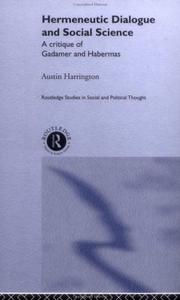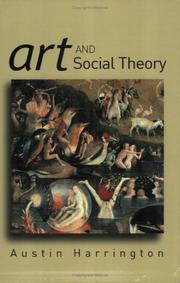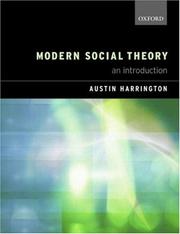| Listing 1 - 10 of 10 |
Sort by
|

ISBN: 0415290465 Year: 2006 Publisher: London Routledge
Abstract | Keywords | Export | Availability | Bookmark
 Loading...
Loading...Choose an application
- Reference Manager
- EndNote
- RefWorks (Direct export to RefWorks)
"The Encyclopedia of Social Theory provides a reference source for students and academics, embracing all major aspects of the field. Written by more than 200 internationally distinguished scholars, almost 500 entries cover core contemporary topics, concepts, schools, debates, and personalities in the history of the discipline. Special attention is paid to leading schools and debates, with shorter entries reserved for biographies of key theorists and definitions of key terms. Entries are fully cross-referenced and contain concise listings for further reading. A comprehensive index guides the reader to further divisions of contents."--BOOK JACKET.
03 --- 316.2 --- Encyclopedieën. Naslagwerken--(Algemene) --- Sociologische richtingen. Sociologische scholen. Sociologen --- Social sciences --- Sociology --- Philosophy --- 316.2 Sociologische richtingen. Sociologische scholen. Sociologen --- 03 Encyclopedieën. Naslagwerken--(Algemene) --- Behavioral sciences --- Human sciences --- Sciences, Social --- Social science --- Social studies --- Civilization

ISBN: 0415249724 Year: 2001 Publisher: London Routledge
Abstract | Keywords | Export | Availability | Bookmark
 Loading...
Loading...Choose an application
- Reference Manager
- EndNote
- RefWorks (Direct export to RefWorks)
Social sciences --- Philosophy. --- Social philosophy --- Social theory --- Philosophy --- Gadamer, Hans-Georg, --- Habermas, Jürgen. --- Habermas, Jürgen --- Gadamer, Hans-Georg --- Habermas, Jürgen. --- Habermas, Jürgen --- Habŏmasŭ, Wirŭgen --- Habŏmasŭ --- Khabermas, I︠U︡. --- Khabermas, I︠U︡rgen --- Ha-pei-ma-ssu, Yu-erh-ken --- Habeimasi --- הברמאס, יורגן --- יורגן הברמס --- 哈贝马斯

ISBN: 0745630391 0745630383 Year: 2004 Publisher: Cambridge ; Malden, MA : Polity Press,
Abstract | Keywords | Export | Availability | Bookmark
 Loading...
Loading...Choose an application
- Reference Manager
- EndNote
- RefWorks (Direct export to RefWorks)
Arts and society. --- Arts --- Philosophy. --- History of civilization --- Aesthetics --- Sociology of culture --- #SBIB:316.7C210 --- Cultuursociologie: kunst: algemeen --- Arts and society --- Arts and sociology --- Society and the arts --- Sociology and the arts --- Philosophy --- Social aspects --- Aesthetics, Modern

ISBN: 0199255709 9780199255702 Year: 2005 Publisher: Oxford Oxford University Press
Abstract | Keywords | Export | Availability | Bookmark
 Loading...
Loading...Choose an application
- Reference Manager
- EndNote
- RefWorks (Direct export to RefWorks)
Social sciences --- Philosophy. --- Social philosophy --- Social theory --- Philosophy --- Sociological theories --- Sociological theory building
Book
ISBN: 9781107110915 9781316275658 9781107527782 1316275655 9781316458549 1316458547 9781316456620 1316456625 1107527783 1316456145 9781316456149 1316458067 9781316458068 1316455181 9781316455180 1316455661 9781316455661 1107110912 1316452301 9781316452301 Year: 2016 Publisher: Cambridge
Abstract | Keywords | Export | Availability | Bookmark
 Loading...
Loading...Choose an application
- Reference Manager
- EndNote
- RefWorks (Direct export to RefWorks)
There has been considerable interest in recent years in German social thinkers of the Weimar era. Generally, this has focused on reactionary and nationalist figures such as Schmitt and Heidegger. In this book, Austin Harrington offers a broader account of the German intellectual legacy of the period. He explores the ideas of a circle of left-liberal cosmopolitan thinkers (Troeltsch, Scheler, Tönnies, Max Weber, Alfred Weber, Mannheim, Jaspers, Curtius, and Simmel) who responded to Germany's crisis by rejecting the popular appeal of nationalism. Instead, they promoted pan-European reconciliation based on notions of a shared European heritage between East and West. Harrington examines their concepts of nationhood, religion, and 'civilization' in the context of their time and in their bearing on subsequent debates about European identity and the place of the modern West in global social change. The result is a groundbreaking contribution to current questions in social, cultural and historical theory.
Sociology --- Social sciences --- Sociologists --- East and West --- History --- Philosophy. --- Sociological aspects.
Book
ISBN: 1316455181 1316455661 1316456145 1316456625 1316458547 1316458067 1316275655 1107110912 1107527783 1316452301 Year: 2016 Publisher: Cambridge : Cambridge University Press,
Abstract | Keywords | Export | Availability | Bookmark
 Loading...
Loading...Choose an application
- Reference Manager
- EndNote
- RefWorks (Direct export to RefWorks)
There has been considerable interest in recent years in German social thinkers of the Weimar era. Generally, this has focused on reactionary and nationalist figures such as Schmitt and Heidegger. In this book, Austin Harrington offers a broader account of the German intellectual legacy of the period. He explores the ideas of a circle of left-liberal cosmopolitan thinkers (Troeltsch, Scheler, Tönnies, Max Weber, Alfred Weber, Mannheim, Jaspers, Curtius, and Simmel) who responded to Germany's crisis by rejecting the popular appeal of nationalism. Instead, they promoted pan-European reconciliation based on notions of a shared European heritage between East and West. Harrington examines their concepts of nationhood, religion, and 'civilization' in the context of their time and in their bearing on subsequent debates about European identity and the place of the modern West in global social change. The result is a groundbreaking contribution to current questions in social, cultural and historical theory.
Intellectuals --- Social sciences --- Behavioral sciences --- Human sciences --- Sciences, Social --- Social science --- Social studies --- Civilization --- History --- Germany --- Weimar Republic, Germany, 1918-1933 --- Sociology --- Sociologists --- East and West --- Civilization, Western --- Civilization, Oriental --- Occident and Orient --- Orient and Occident --- West and East --- Eastern question --- Behavioral scientists --- Social scientists --- Philosophy. --- Sociological aspects. --- Asian influences --- Oriental influences --- Western influences
Digital
ISBN: 9781316275658 Year: 2016 Publisher: Cambridge Cambridge University Press
Abstract | Keywords | Export | Availability | Bookmark
 Loading...
Loading...Choose an application
- Reference Manager
- EndNote
- RefWorks (Direct export to RefWorks)
Sociology --- Social sciences --- Sociologists --- Germany

ISBN: 1781388156 1846313864 9781846313868 9781781388150 0853239762 9780853239765 085323986X 9780853239864 Year: 2001 Publisher: Liverpool Liverpool University Press
Abstract | Keywords | Export | Availability | Bookmark
 Loading...
Loading...Choose an application
- Reference Manager
- EndNote
- RefWorks (Direct export to RefWorks)
Max Weber's The Protestant Ethic and the Spirit of Capitalism continues to be one of the most influential texts in the sociology of modern Western societies. Although Weber never produced the further essays with which he intended to extend the study, he did complete four lengthy Replies to reviews of the text by two German historians. Written between 1907 and 1910, the Replies offer a fascinating insight into Weber's intentions in the original study, and the present volume is the first complete translation of all four Replies in English.
Protestant work ethic. --- Capitalism --- Religion and sociology. --- Religion and society --- Religious sociology --- Society and religion --- Sociology, Religious --- Sociology and religion --- Sociology of religion --- Sociology --- Protestant ethic --- Work ethic --- Protestantism and capitalism --- Religious aspects --- Protestant churches. --- Weber, Max, --- ウェーバー, マックス --- Criticism and interpretation. --- Sociology. --- Capitalism. --- Market economy --- Economics --- Profit --- Capital --- Social theory --- Social sciences

ISBN: 085323986X Year: 2001 Publisher: Liverpool : Liverpool university press,
Abstract | Keywords | Export | Availability | Bookmark
 Loading...
Loading...Choose an application
- Reference Manager
- EndNote
- RefWorks (Direct export to RefWorks)
Digital

ISBN: 9783839418772 9783837618778 Year: 2014 Publisher: Bielefeld transcript Verlag
Abstract | Keywords | Export | Availability | Bookmark
 Loading...
Loading...Choose an application
- Reference Manager
- EndNote
- RefWorks (Direct export to RefWorks)
| Listing 1 - 10 of 10 |
Sort by
|

 Search
Search Feedback
Feedback About UniCat
About UniCat  Help
Help News
News